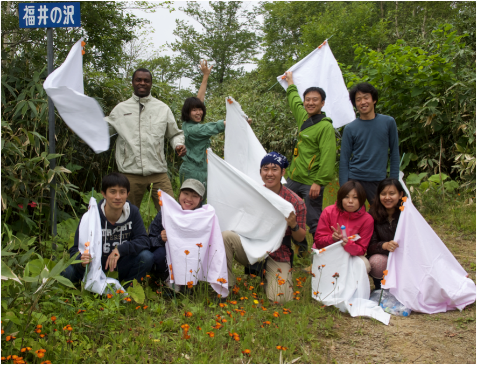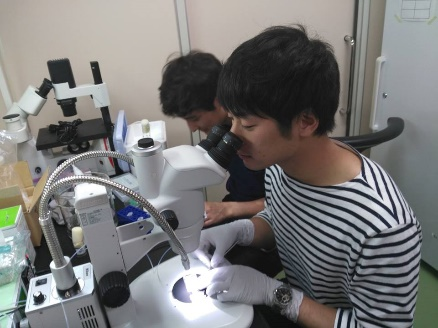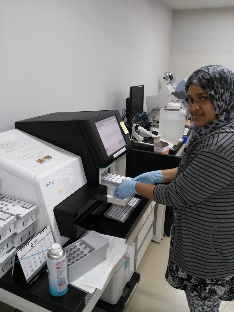| モジュール番号 Module |
3 |
|---|---|
| Credits ( if register as Inter Graduate School Classes Coursd of Hokkaido University ): | 2 |
| 責任教員(所属) Instructor name (Affiliation) |
中尾 亮 (北海道大学大学院獣医学研究院 寄生虫学教室) Ryo NAKAO (Laboratory of Parasitology, Faculty of Veterinary Medicine, Hokkaido University) |
| 責任教員連絡先(メール)/Instructor email | ryo.nakao*vetmed.hokudai.ac.jp |
| 責任教員連絡先(電話)/Instructor phone | 011-706-5196 |
| Link to instructor bio or website | https://www.vetmed.hokudai.ac.jp/organization/parasitol/en_top.html |
| Teaching Assistant name and contact info | 松野 啓太(北海道大学人獣共通感染症国際共同研究所 危機分析・対応部門)、尾針 由真(北海道大学人獣共通感染症国際共同研究所 危機分析・対応部門)、小方 昌平(北海道大学人獣共通感染症国際共同研究所 国際展開推進部門) Keita MATSUNO (International Institute for Zoonosis Control), Yuma OHARI (International Institute for Zoonosis Control), Shohei OGATA (International Institute for Zoonosis Control) |
| 実施期間/Periods | 23th-25th July 2025 (Pre-lecture on 16th, Jul., Hands-on practice on 28th, Jul.) |
| Language | English |
| 実施場所/Class Locations | 1. Potential field sites for tick sampling in Toyama Prefecture 2. Laboratory class International Institute for Zoonosis Control, Hokkaido University |
マダニは様々な病原体を伝播する公衆衛生上重要な外部寄生虫である。国内で流行するダニ媒介性感染症の疫学研究を体験する目的で、参加者はダニ媒介性感染症の流行地での野外調査、獣医大学・地方衛生研究所などの流行地の関係機関の訪問、実験室でのマダニ同定・病原体検出試験を実践する。地域ごとに異なるマダニ媒介性感染症のリスク要因を考察し、それらに対する有効な対策や課題についてグループディスカッションにより理解を深める。
Ticks are ectoparasites that transmit a variety of pathogens threatening human and animal health. For the purpose of experiencing epidemiological research on tick-borne diseases in Japan, participants conduct field surveys in the disease endemic areas, visit relevant institutions in endemic areas such as veterinary universities and regional health institutes, and learn tick identification and pathogen detection methods in the laboratory. Risk factors for tick-borne infectious diseases that vary from region to region will be discussed. Finally, group discussions will be held to deepen understanding of effective countermeasures against ticks and tick-borne diseases.
野外調査に適した服装。 参加者にはハンドアウトが配られます。
Field wears. The handout will be distributed for the participants.
1) 事前講習:マダニ調査の概論、野外調査における注意等
2) 野外調査:富山県
3) 実習1:マダニ種の同定
4) 実習2:マダニ中の病原体検出
|
1日目 |
事前講習@北大 |
|
2日目 |
札幌→千葉 |
|
3-4日目 |
・座学@近隣の機関・野外環境でマダニ採集 |
|
4日目 |
茨城→札幌 |
|
5日目 |
ハンズオン実習@北大 |
1) Pre-Lecture: Introduction to tick study and risks of field study
2) Field work : Toyama Prefecture
3) Practice 1: Species identification of ticks
4) Practice 2: Detection of tick-borne pathogens
|
Day 1 |
Pre-Lecture@HU |
|
Day 2 |
Sapporo→ Chiba |
|
Day 3-4 |
・Lecture@ Venue TBD ・Tick Sampling |
|
Day 4 |
Ibaraki-> Sapporo |
|
Day 5 |
Hands-on Practice@HU |

Tick sampling

Tick species identification

Molecular screening of tick-borne pathogens
1) 野外におけるマダニ採集法ならびにマダニ種同定法を実践できる。
2) ダニ媒介性感染症感染症の地域ごとの発生リスクについて説明できる。
3) マダニが保有する病原体検出法を理解し、それぞれの利点、欠点について説明できる。
1) To understand tick collection methods in the field and keys for species identification of ticks.
2) To explain the risk factors for tick-borne diseases in the surveyed regions.
3) To understand the several molecular detection methods for tick-borne pathogens and explain advantage and disadvantage of each method.
引率学生数4名 応募者多数の場合は、感染症研究を専門としない学生を優先します。
Number of students : 4
In the case of a large number of applicants, students whose major is not infectious diseases have priority.